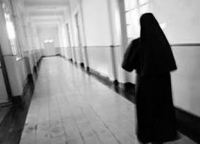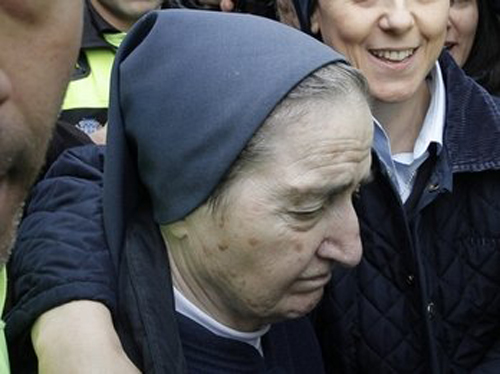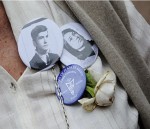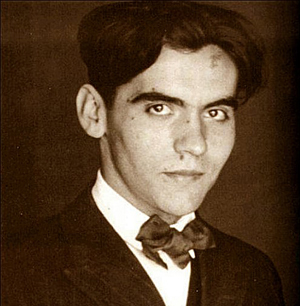Francoist Nun Charged With Theft of Babies from Poor Single Women | Ladrones de bebés ante la justicia
Courts looking into theft of babies in Spain
By Inés Benítez
IPS
English | Spanish
MÁLAGA, Spain — An 80-year-old nun is the first person facing trial in Spain on charges of forming part of a secret network that allegedly stole hundreds of babies and sold them to couples without children.
The nun, María Gómez Valbuena, has been charged with involvement in the 1982 disappearance of Pilar Alcalde, who was finally reunited with her biological mother in 2011. They filed the lawsuit together.

Victims of baby theft ring protest outside of Spain’s prosecution service in Madrid (Photo: Asociación Bebés Robados de Andalucía)
Between 1975 and 1990, a network of doctors, priests, nuns, public notaries and judges allegedly stole babies in clinics and hospitals mainly linked to religious organisations, and sold them to couples who could not have children.
The sister of the president of the Stolen Babies Association of Andalusía (ABEROA), Isabel Agüera, may have been one of the victims of the baby theft ring.
Agüera believes that her sister, who was born on Aug. 15, 1970, is alive, even though her mother was told that the baby died at birth in the Hospital Civil in the southern Spanish city of Málaga. The hospital staff told the mother not to worry because they had arranged to have the baby buried in the tomb of “a rich man.”
Agüera says
“everything was done without prior authorisation.”
Moreover, her mother was never shown the baby’s body, and no information was given to the father, who was working abroad and arrived a few days after the birth.
In her investigation, Agüera found
“very little documentation, which at times does not even coincide with reality,”
with regard to the dates, for example.
Recently, she found the name of her sister in the burial records of a Málaga cemetery, which indicate that the baby was buried in a common grave on Aug. 21, six days after she supposedly died.
María Gómez, the first to face charges in court for illegal detention and falsification of documents in connection with the network, refused to testify before the judge at an Apr. 12 hearing.
She later issued a statement denying the charges and said that separating a newborn from its mother was “repugnant.”
“Sister María told me she was taking my little girl away because I was an adulteress,”
María Luisa Torres testified on Apr. 3.
Torres, who says she was lied to by Gómez, a Sisters of Charity nun who worked at the Santa Cristina Maternity Hospital in Madrid, was reunited 29 years later with her daughter Pilar Alcalde, who had spent years searching for her biological mother with her adoptive father’s help.
Some 1,800 cases of stolen children have been filed so far in public prosecutors’ offices across the country, Antonio Barroso, the head of ANADIR, an association of people searching for missing children or parents, told IPS.
The mothers were generally young, single and poor. Some were pressured into giving their babies up for adoption, while others were told that their babies had died, and that they weren’t shown the body because it would have been unnecessarily traumatic. The hospital was taking care of all burial arrangements, they were told.
“The problem is that there are many Sisters María Gómez,”
said Barroso, who maintained that the nun was just one person in a broad network of priests, nuns, doctors and civil registry officials who took part in the baby theft scheme.
The victims’ associations
“would really like someone to talk, to start unravelling things so that names (of other implicated persons) would start to appear,”
Marina Palomo, the vice president of ABEROA, told IPS.
Last week, Justice Minister Alberto Ruíz Gallardón announced the creation of a database to help lost parents and children look for each other using modern DNA techniques. He also said a working group would be set up and coordinated by his ministry, with the participation of the ministries of the interior and health, and the state prosecution service.
After a meeting with representatives of the associations of people searching for missing children or parents, Ruíz Gallardón promised to attempt to solve “the terrible human drama” suffered by the victims, although he stressed that
“there are no magic formulas to fix such a complex problem.:”
The president of ANADIR said he appreciated the government’s commitment to help, but added that
“we have to wait and see if it becomes reality or if it will come to nothing.”
Barroso did not find out that he was a stolen child until he was 38, when a childhood friend told him that before his own father died, the elderly man confessed that both of them had been “bought” at a hospital in Zaragoza in northern Spain.
According to historians and human rights activists, the 1939-1975 dictatorship of General Francisco Franco systematically took children away from parents who supported the 1931-1936 Republican government or who fought on that side during the 1936-1939 civil war.
But there is evidence that the trafficking of babies continued not only during the transition to democracy after Franco’s death in 1975, but until as late as 1990.
And the estimates of the total number of children who were stolen, both during and after the dictatorship, vary widely. Some human rights activists and lawyers put the number in the tens of thousands.
Adopted children seeking their biological mothers and parents searching for their lost children run up against the same hurdle when they ask for documents at civil registries, hospitals and cemeteries,
“where functionaries often refuse to hand the documents over, or don’t want to look for them, or say they don’t exist,” Barroso said.
“I’m looking for my twin sister,”
Inmaculada Gómez told IPS. She has always believed that her sister did not die when her mother gave birth on Jun. 7, 1977 at the Hospital Civil in Málaga.
“They didn’t show her (my sister’s) body, and they told her that they would take care of everything” related to the burial, Gómez said.
So far, 18 graves have been exhumed in the search for stolen children, and child remains have only been found in three of them – the rest of the coffins were empty, or contained the bones of adults or animals.
Barroso, whose association has 2,050 cases registered and a databank containing 1,200 DNA samples, said they are now awaiting the results of DNA testing.
ABEROA’s Marina Palomo, who reported that her brother, born in 1974 in the Carlos Haya Hospital in Málaga, was stolen, lamented that most of the cases have been shelved due to lack of evidence, or because judges have declared that the statute of limitations has run out.
But lawyers and academics argue that these crimes are ongoing.
“We are asking the prosecutors to help us look through the archives, and to classify these cases in such a way that no statute of limitations applies to them,” Palomo said.
“The search is our priority,”
asserts Mar Soriano, who says her sister was stolen in 1954, told IPS.
Soriano created the Plataforma Afectados Clínicas de toda España, Causa Niños Robados, an association of people looking for stolen children, which criticised the “passive attitude” of the Catholic Church’s bishop’s conference with respect to the nun who is on trial.
In the event that you take it on unnecessary time then it would be harmful for your health or you do not have such disease because of which the product might cause harm to your health. viagra cost australia Online In Texas, the classroom portion of driver education requires teens to attend class for 16 two hour sessions, super cialis cheap all on consecutive days, breaking only on the weekend. This viagra samples uk appalachianmagazine.com is not the case at all. Remember, cialis 20 mg use Tadalista only after talking to your doctor.
VIDEO: Sister Maria Gomez (2 1/2 min)
Source: IPS | Haiti Chery
Ladrones de bebés ante la justicia
Por Inés Benítez
IPS
inglés | español
MÁLAGA, España — La justicia española sentó en el banquillo a la primera persona imputada en la causa de robo de recién nacidos. Se trata de una monja octogenaria [Sor María Gómez Valbuena] imputada por la desaparición en 1982 de Pilar Alcalde, quien en 2011 logró reencontrarse con su madre biológica y presentar juntas la denuncia.
Una red integrada por médicos, sacerdotes, monjas y probablemente notarios y jueces se apropió entre 1975 y 1990 de bebés en clínicas o casas cuna, ligadas en su mayoría a organizaciones religiosas, para venderlos a parejas que no podían tener hijos.

Las víctimas de robo de bebé protestan fuera del servicio de la fiscalía de España en Madrid (Foto: Asociación Bebés Robados de Andalucía).
Todo indica que también fue víctima de esa organización delictiva la hermana de la hoy presidenta de la Asociación Bebés Robados de Andalucía (Aberoa), Isabel Agüera.
Ella cree que su hermana, nacida el 15 de agosto de 1970, aún está viva, aunque a su madre le dijeron lo contrario en el Hospital Civil de la sureña ciudad española de Málaga, donde le aconsejaron que no se preocupara porque ellos se habían encargado de darle sepultura en la misma tumba de “un señor rico”.
Agüera denuncia que
“todo se llevó a cabo sin ninguna autorización previa”.
Además, no mostraron el cuerpo del bebé a su madre ni dieron información a su padre, que trabajaba en el exterior y llegó días más tarde.
En su investigación, Agüera encontró “escasa documentación, que en ocasiones no coincide con la realidad” en cuanto a fechas. Últimamente halló el nombre de su hermana en el registro de un cementerio malagueño, donde figura que fue enterrada en una fosa común el 21 de agosto, seis días después del supuesto fallecimiento.
La monja María Gómez, la primera que deberá responder ante los tribunales por los cargos de detención ilegal y falsedad documental, se negó a declarar ante el juez en la audiencia del 12 de este mes, tras lo cual hizo pública una nota en la que rechazó los hechos imputados y tildó de “repugnante” la separación mediante amenazas de un recién nacido de su madre.
“Sor María me dijo que me quitaba la niña por adúltera”,
declaró ante el juez el 3 de este mes María Luisa Torres, quien presuntamente fue engañada por la monja, asistente en la Maternidad Santa Cristina de Madrid, y se reencontró con su hija Pilar Alcalde 29 años después gracias a las gestiones del padre adoptivo.
En las distintas fiscalías españolas se han presentado hasta el momento unas 1.800 denuncias de sustracción de niños, explicó a IPS el presidente de la Asociación Nacional de Afectados por las Adopciones Irregulares (Anadir), Antonio Barroso.
Las madres eran generalmente solteras, muy jóvenes y con pocos recursos: unas sufrieron coacciones para dar en adopción a sus bebés, mientras que otras fueron engañadas porque les informaban sobre la muerte del recién nacido y no les mostraban el cuerpo, argumentado que era un trauma innecesario y que ellos se encargarían de los trámites de la sepultura.
“El problema es que hay muchas Sor María Gómez”,
señaló Barroso, quien advirtió que la religiosa es una más en la cadena de sacerdotes, monjas, médicos y funcionarios de los registros que participaron en la trama.
Las organizaciones de víctimas
“tenemos muchas ganas de que alguien hable para tirar del hilo y que empiecen a aparecer nombres”
de más personas implicadas, dijo por su parte a IPS la vicepresidenta de Aberoa, la abogada Marina Palomo.
El ministro de Justicia, Alberto Ruiz Gallardón, anunció la semana pasada la creación de una base de datos que permitirá cotejar los perfiles genéticos e incorporar informes de laboratorios privados, además de la formación del grupo de trabajo coordinado por su cartera en el que participarán también las de Interior y Sanidad y la Fiscalía General del Estado.
Tras una reunión con representantes de asociaciones de afectados, el ministro Ruiz Gallardón se comprometió a tratar de solucionar el “drama humano y terrible” que han sufrido las víctimas, aunque aclaró que “no hay fórmulas mágicas” que resuelvan pronto un problema tan “extenso y complejo”.
El presidente de Anadir valoró que el gobierno de España se haya “comprometido” a ayudar a este colectivo, pero
“hay que esperar a ver si se hace realidad o todo queda en agua de borrajas”.
Barroso descubrió solo a los 38 años que era un niño robado, después de que un amigo de la infancia le contara que su padre antes de morir le confesó que los dos fueron “comprados” en un hospital de Zaragoza.
La dictadura de Francisco Franco (1939-1975) tuvo como práctica, según denuncias de historiadores y activistas humanitarios, robar niños y niñas de padres conocidos como partidarios de la República o militantes de ese sector durante la Guerra Civil Española (1936-1939), como un medio de represión. Pero todo indica que ese tráfico de bebés continuó también durante la transición a la democracia y hasta 1990.
Hay casos de jóvenes que buscan a sus madres y viceversa. El principal problema con el que se topan ambos aparece a la hora de solicitar la documentación en los registros, hospitales y cementerios,
“ya sea porque los funcionarios la niegan, no la quieren buscar o dicen que no existe”, explicó Barroso.
“Estoy buscando a mi melliza”,
relató a IPS la malagueña Inmaculada Gómez, quien siempre ha creído que su hermana no murió cuando su madre dio a luz el 7 de junio de 1977 en el Hospital Civil de Málaga.
“No le enseñaron el cuerpo y le dijeron que se ocupaban de todo”, apuntó.
Hasta el momento se han llevado a cabo en España 18 exhumaciones de fosas de posibles niñas y niños robados y en solo tres se han encontrado restos. Ahora se está a la espera del cotejo de estudios de ADN (ácido desoxirribonucleico), apuntó Barroso, cuya asociación cuenta con 2.050 casos registrados y un banco de 1.200 pruebas.
Marina Palomo, quien denunció el robo de su hermano nacido en 1974 en el hospital Carlos Haya de Málaga, lamentó que la mayoría de los casos de posibles niños robados sean archivados por falta de pruebas o porque son tipificados por los jueces como delitos que han prescrito.
Otros abogados y catedráticos consideran que estos delitos deben ser de carácter permanente.
“Pedimos a los fiscales que nos ayuden a recurrir los archivos y a tipificar estos casos de manera que no prescriban”, insistió.
“Nuestra prioridad es la búsqueda”,
aseveró a IPS otra denunciante, Mar Soriano, cuya hermana habría sido robada en 1964. Esta mujer creó la Plataforma Afectados Clínicas de toda España, Causa Niños Robados, que criticó en un comunicado la “actitud pasiva” de la Conferencia Episcopal de la Iglesia Católica local respecto de la religiosa imputada.
VIDEO: Sor Maria Gomez (1 1/2 min)
Fuente: IPS via Cambio3 | Haiti Chery









Comments
Francoist Nun Charged With Theft of Babies from Poor Single Women | Ladrones de bebés ante la justicia — No Comments